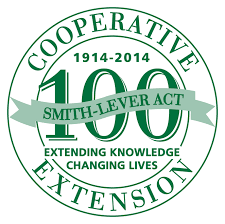Written By: Toija Riggins
One Hundred Years of Cooperative Extension
The Smith-Lever Act of 1914 created the Cooperative Extension Service as a partnership between U.S. Department of Agriculture (USDA), the land-grant university (LGU) system, and local governments. USDA supports both the universities and local offices of the Cooperative Extension System to bring science directly to youth, families, and communities at regional and county levels. This unique federal-state-local partnership has worked effectively for more than 100 years.
Family and Consumer Sciences (FCS) is a field of study focused on the science and art of living well in our complex world and is a critical part of the total Cooperative Extension System’s educational program. FCS Extension provides science-informed, non-formal education from the nation’s land-grant universities to help Americans develop skills to live healthier and more productive lives.
An extremely important type of outreach education provided by FCS Extension is personal and family finance education. FCS Extension educators nationwide provide unbiased, research-informed education and tools to empower families to manage their personal finances. They also develop, promote, and engage in professional development that advances the field.
Cooperative Extension Pre-Symposium at AFCPE
Annually, FCS Extension personal and family finance educators assemble before the official start of the AFCPE Symposium to discuss emerging issues, share best practices, celebrate successes, and strategize for the future. In 2018, the Extension Pre-Symposium’s theme was “Exploring Opportunities and Addressing Gaps in Financial Education.” Nearly 50 finance educators from state and local extension offices around the country gathered to identify opportunities for increasing the reach and impact of this important work.
The 2018 Extension Pre-Symposium Chair, Dr. Carrie Johnson of North Dakota State University, opened the session with a warm welcome that was followed by a fun “financial vanity license plate” icebreaker activity, to get the group started. With an introduction by USDA National Program Leader, Dr. Toija Riggins, the program quickly moved to the central teamwork of the day—a SWOT analysis of four emerging opportunities in Extension personal finance education: (1) Increasing Our Research Base; (2) Finding Resources for Training and Professional Development; (3) Increasing Partnerships; and (4) Leveraging Public Relations. After participants completed their table group work, wonderful group leads (Dr. Barbara O’Neill of Rutgers University, Dr. Jesse Ketterman of University of Maryland, Dr. Michael Gutter of University of Florida, Drs. Toija Riggins and Karl Maxwell from USDA) reported back to the body on common themes that emerged. Common themes included the need to think carefully about: communicating our work and value to broader audiences; balancing the heavy demand for extension personal finance education with the supply of staffed positions and resources; and adapting effectively to the myriad changes around us.
The session then moved to a report on the status of a concept test of Family Resource Management Common Indicators and Common Reporting, by Dr. Elizabeth Kiss of Kansas State University and Dr. Maria Pippidis of University of Delaware. This cutting-edge effort to streamline and standardize impact reporting across Extension personal and family finance programs nationwide represents an exciting frontier and has sustained its momentum over the past several years.
Led by Dr. Laura Hendrix of University of Arkansas, a series of Ignite presentations followed, highlighting outstanding and innovative personal and family finance programming and research being conducted by FCS Extension across the country. Pre-Symposium participants voted for their favorite Ignite and the top two presentations were awarded with a gift card. The Ignite presentations were:
-
Financial & Legal Tools for Caregivers Facing “Double” Estate Legacy Planning (Dr. Marsha Goetting, Montana State University)
-
Bridging the Gap: Building the Financial Education Capacity of New Jersey Teachers (Dr. Barbara O’Neill, Rutgers University)
-
Teaching Adults Personal Finance with Games (Mr. Luke Erickson, University of Idaho)
-
Effective Extension Succession Planning Programming (Ms. Ellen Bjelland, North Dakota State University)
-
You Don’t Know What You Don’t Know Until You Know It – Using a Pre-Post- test and Simple Statistics to Document Extension Program Impact (Dr. Martie Gillen, University of Florida)
To begin wrapping up the full morning’s activities, Ms. Sasha Grabenstetter, University of Illinois, led participants through a fun and challenging Kahoot Game. Competition was tight and the winner received a gift card. Ms. Grabenstetter also provided tips for using Kahoot in Extension programming, including engagement and data collection. Chair, Dr. Carrie Johnson of NDSU, closed the day with fond parting remarks and all participants ended the Pre-Symposium by sharing a boxed lunch and networking.
This annual event provides a rare opportunity for Extension personal finance educators to meet in person and regroup for the coming year. It also represents the collaboration among Extension and its many, valued partners, including USDA, NEFE, and AFCPE, who contribute to the success of this important meeting.
Toija Riggins, Ph.D. is National Program Leader, for the USDA’s National Institute of Food and Agriculture.
